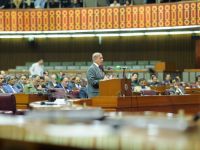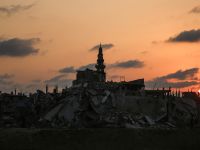By Justin Keay
LONDON (WNL) -- The Balkans, not normally a source of good news, has gone against type: The ouster of Yugoslav President Slobodan Milosevic and the recent municipal elections in Kosovo, more peaceful than anybody had dared hope, with Ibrahim Rugova's party pulling ahead of the more nationalist party of Hashim Thaci, all suggest a slow return to normality. Rugova's victory has even raised hopes that a moderate and inclusive government could emerge when parliamentary elections are finally held and that it will be able to talk to Belgrade about resolving the territory's long-term status.
Western concern has for the time being shifted eastward to the region's two largest economies, Romania and Bulgaria, where within the next six months deeply unpopular reformist governments face elections that analysts say they are well placed to lose. If this happens, hopes that the Balkans could begin to start closing the prosperity gap with central Europe could be dashed.
"If the worst happens and leftist governments come to power, start stopping privatization and restructuring, and don't bother attempting to meet European Union accession criteria, all the hard work of the last few years will be undone," says one western diplomat in Bucharest.” Forget Serbia and Croatia: In the long run, Bulgaria and Romania are absolutely critical to the future of the Balkans.”
First off the blocks is Romania, where parliamentary and presidential elections are to be held at the end of November. Recent opinion polls suggest the left of center Party for Social Democracy in Romania (PDSR) is way ahead of other parties in the polls with well over 50 percent of the vote. Support for the PDSR's Ion Iliescu, who held the country's presidency between 1990-96 and is blamed for the country's late start with reform and preparing for EU membership, is estimated at about 48 percent. This raises the possibility that, provided he can get out just a little more of the rural vote -- always leaning to the left -- he could actually win the presidency in the first round.
"With Iliescu getting around 40 percent of the vote, and the elections going to a second round, I'd have said there was a good chance of voters getting behind one of the other (more liberal) candidates -- probably either Prime Minister Mugar Isarescu or former Prime Minister Theodor Stolojan -- and denying Iliescu victory. But if he can win without a second round, well, it's all over," says Charlie Robertson, who monitors Romania closely for a London-based bank.
Iliescu is stressing "Romanian values," with the Orthodox Church and the army key to these. He has also promised to raise living standards, boost investments, eliminate corruption, reform the tax system, and support medium-sized enterprises. However, although Iliescu has said he prioritizes membership for Romania in the EU and NATO, as well as pushing ahead with reform generally, western observers are unconvinced. Not only is he well over 70 -- quite an old age to be changing ones' political spots -- he seems unaware of how far the country still needs to go to have a chance of modernizing the economy and being ready to start serious accession discussions with the EU.
The irony is that he would be coming to power just as the modest reforms of the current, center-right government that has been hampered by infighting, are beginning to yield results. By Romanian standards, the year 2000 has not been bad. After years of scraping along the bottom, Romania's economy is finally showing some signs of recovery, despite the battering the agricultural sector took with the heat wave of June and early July. Exports are booming, which has improved the once-precarious balance of payments position and encouraged growth. GDP is expected to grow a modest 1.3 percent, while inflation should be at 35 percent, compared to 55 percent in 1999. Analysts say the recovery reflects the steady hand of Prime Minister Mugar Isarescu, formerly governor of the National Bank, appointed to his current post last December, who compared to his predecessors has been the model of competence.
A few days ago the European Parliament issued a report on Romania's progress to EU membership, suggesting the country's economic situation is "worrying," despite the improvements. Amongst the need for general restructuring at the industrial and agricultural level, Bucharest faces serious environmental problems and large-scale corruption and criminality, all of which have held back much-needed foreign investment.
On the encouraging side, however, the PDSR may not prove to be as incompetent or reform-averse as its leaders were when they ruled before 1996. Party leader Adrian Nastase is a modernizer who has indicated that even if his party gets an absolute majority in the elections, he may still prefer a coalition, like Hungary's Socialists after the 1994 elections, when premier Gyula Horn agreed to a coalition with the liberal Alliance of Free Democrats. Likely partners of the PDSR are the Democratic Party, the Alliance for Romania (both of which are breakaway parties from the PDSR) or the Liberals. Such an alliance would boost the new government's image in the eyes of otherwise skeptical western observers. Such things are important for Nastase who has his eyes set long-term, on the presidency: If he can get the economy right as prime minister, with Iliescu as president, he could expect to reap the political dividends for many years.
Bulgaria's parliamentary elections are not due until April 2001, but doomsayers are warning that after years of tough austerity with little evidence yet of a feel-good factor and endless news of top-level corruption, Bulgaria's voters are in unforgiving mood. Opinion polls suggest the elections, due by April but that could be held earlier, will be close, with the government determined by how smaller parties like Euroleft, the Turkish minority Party and the anti-corruption Gergyovden movement fare and then decide to swing their support.
"It's pretty wide open," says Matthew Czepliewicz, an analyst who covers Bulgaria for Schroder Salomon Smith Barney. He argues that the new government will have little choice in terms of economic policy if Bulgaria is to stay on track to join the European Union and abide by its agreements with the International Monetary Fund. It also may not want to change much, as the policies of the current Union of Democratic Forces (UDF) government have been successful.
This year is expected to see GDP grow by at least 4 percent, with inflation expected to be below 7 percent. Exports in the first six months have increased 40 percent in deutschemark terms, while imports have also risen, by about 37 percent, suggesting consumption and confidence are on the rise. Most importantly, investors are returning to the country: Foreign direct investments increased by about $775 million last year with a similar rise expected for 2000, equivalent to an impressive 6 percent of GDP. This is despite this year's failure to privatize the Bulgarian Telecommunications Company: The buyer would have been the state-owned Greek company OTC, which wanted monopoly control of Bulgaria's telecommunications space in contravention of EU rules. Sofia blocked the sale.
The government has also been tough on corruption, even within its own ranks, although what has depressed most Bulgarians has been just how extensive and pervasive the problem is. The popular view of politicians, never high, is close to rock bottom, although President Petar Stoyanov and Prime Minister Ivan Kostov still command significant support.
Although figures show GDP per capita has risen 50 percent since the dog days of 1997, one would never believe it from newspapers and opinion polls, which consistently suggest that Bulgarians are amongst the gloomiest people in Europe. Indeed the number of people thinking things will deteriorate, rather than improve, has increased dramatically since early 1999.A poll taken by BBSS Gallup in June, before the corruption scandals really hit, suggested a full 70 percent of those interviewed thought things would get worse, against only 15 percent looking to an improvement.
Against such a backdrop, analysts warn that the unreconstructed Socialist Party, led by Georgi Parvenov, would be disastrous for Bulgaria's economy and its aspirations to join the EU. Although the UDF, currently in power, is languishing at around 24 percent in the polls, support for the Socialists -- despite high unemployment and other gloom factors -- has stayed between 15-18 percent, with most Bulgarians plainly unable to forgive them for the gross economic mismanagement which brought the country to the brink of collapse in 1996-97.
"A broadening of the current UDF-led coalition seems likely," says Chuck Moffit of Planecon, a Washington, D.C.-based consultancy, pointing to the Turkish ethnic party called Movement for Rights and Freedoms (MRF) as the most likely partner.
With six months to go, the government is already doing what it can to win over voters. As well as a tax cutting budget for 2001, it has frozen the prices of fuel and other necessities ahead of the winter. So although much will depend on the extent to which the government can encourage Bulgarians to feel good about the often-tough reforms of the past few years, the UDF looks set to constitute at least part of the government after next April. Which may help Bulgarians move a little closer to their neighbors in the West.
© 2000 Al Bawaba (www.albawaba.com)







